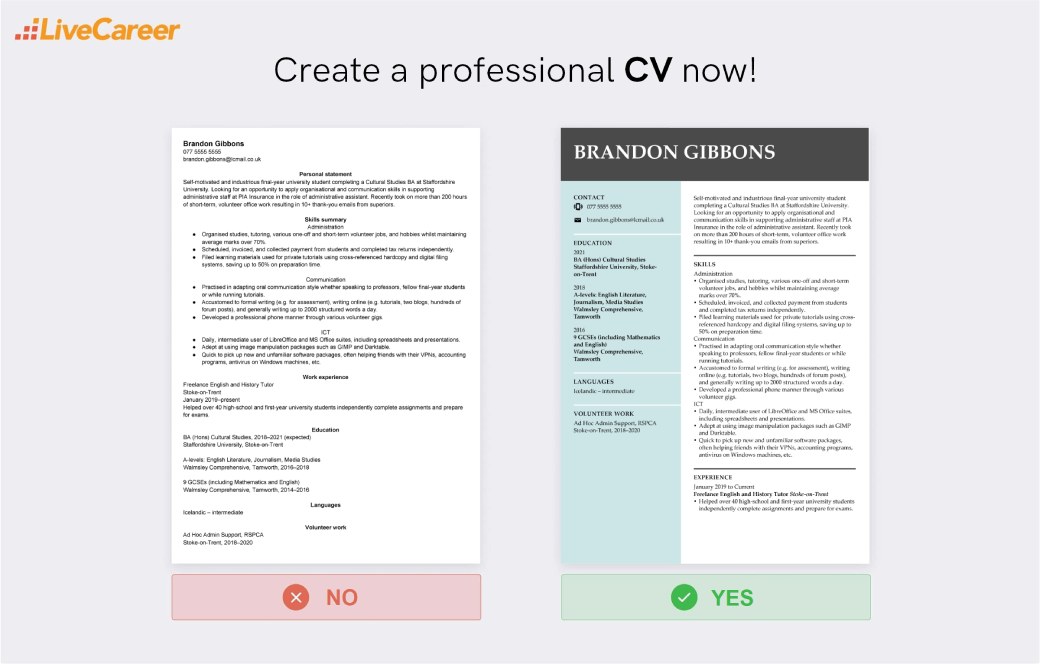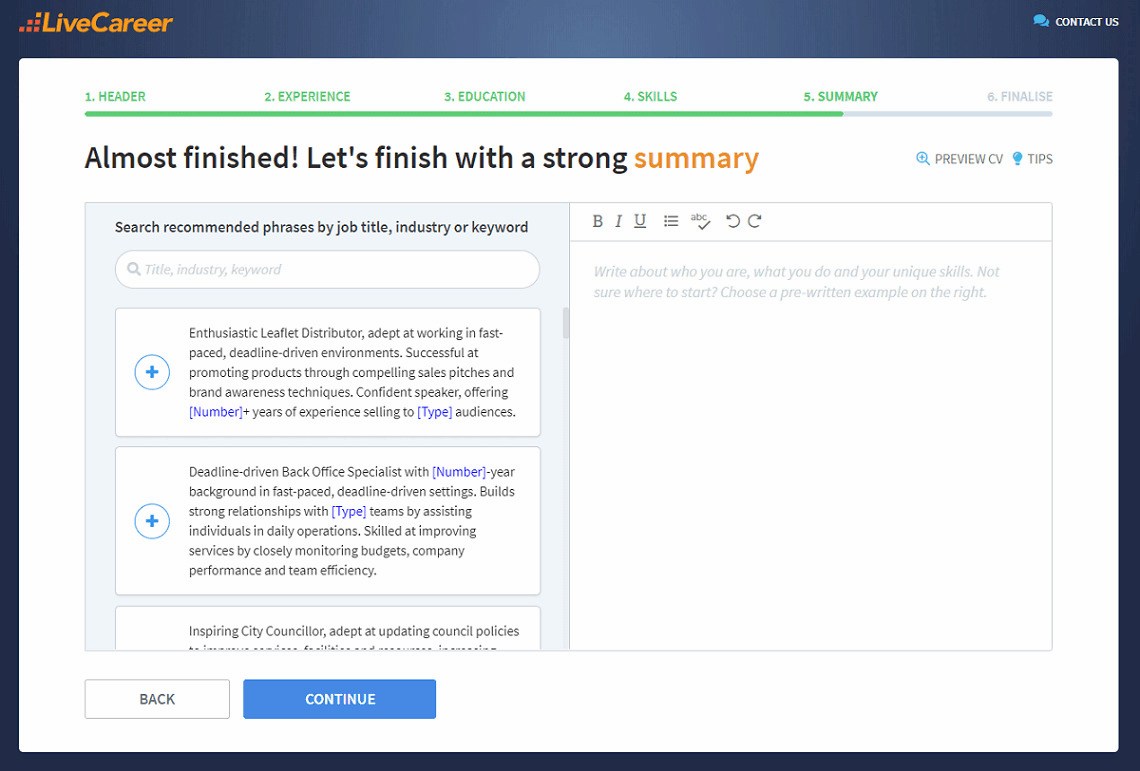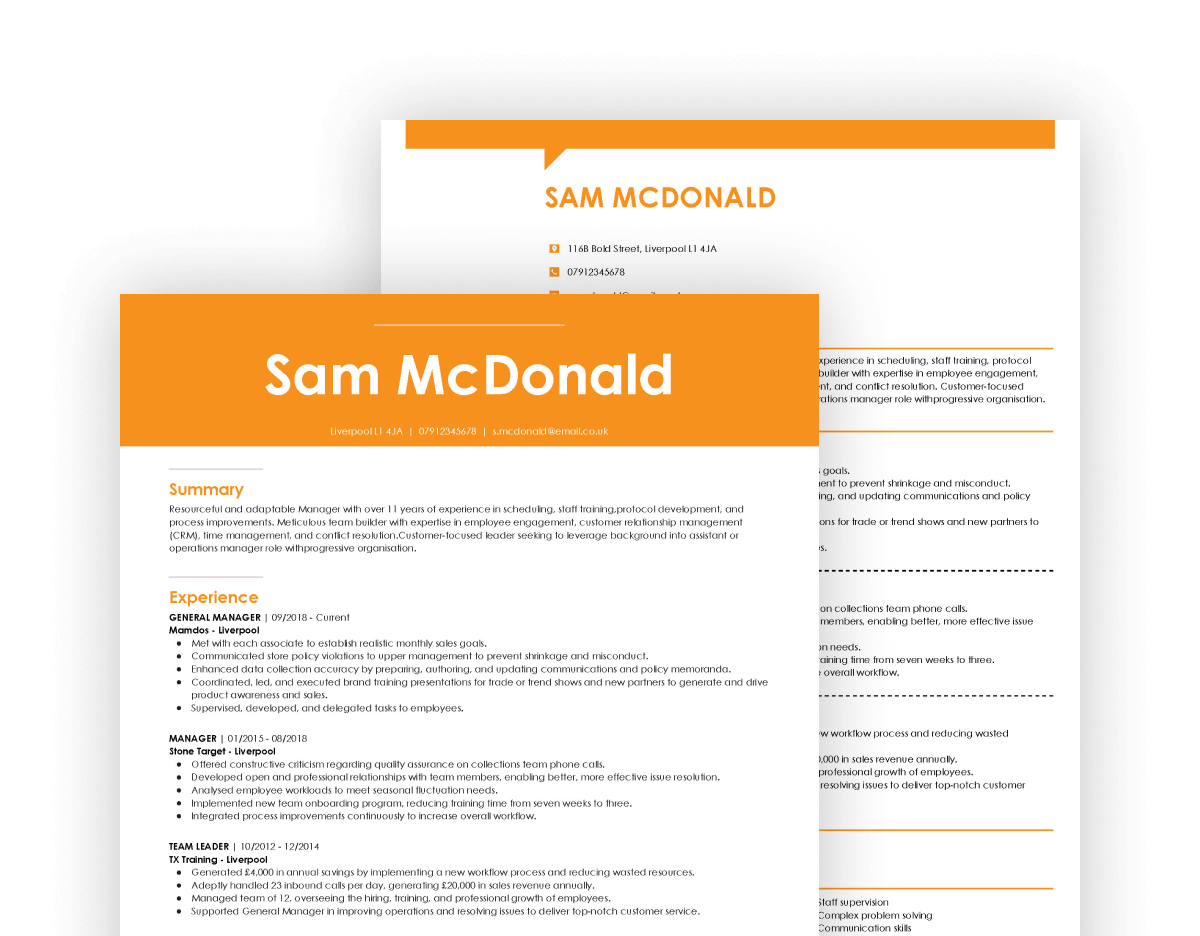
What Does a CV Stand For? CV Meaning Explained
What does a CV stand for? Read our comprehensive guide and learn the CV meaning compared to a resume meaning. No more asking “What’s a CV?” since now.
Our customers were hired by:
Applying for your first job can be an anxious affair. Being judged and having your candidature evaluated by faceless strangers doesn’t sound pleasant. Not having any experience can leave you feeling inadequate and maybe even a little embarrassed.
You’re up against people in a similar boat to yours, and you don’t want their CVs to be better than yours. That’s where this article comes in: learn how to write a CV for a job with no experience, step-by-step. If you’re looking for CV examples for students with no experience or other job candidates with no work history—read further.
Create an effective CV in minutes. Choose a professional CV template and fill in every section of your CV in a flash using ready-made content and expert tips.

We created the sample on the right using our builder. See other good CV examples like this one.
In need of extra advice on CV writing? See these guides:
After reviewing 6 million CVs generated with our builder, we discovered that*:
*The data comes from a period of the last 12 months (August 2023-August 2024).
Brandon Gibbons
077 5555 5555
brandon.gibbons@lcmail.co.uk
linkedin.com/in/brandon.gibbons
Personal statement
Self-motivated and industrious final-year university student completing a Cultural Studies BA at Staffordshire University. Looking for an opportunity to apply organisational and communication skills in supporting administrative staff at PIA Insurance in the role of administrative assistant. Recently took on more than 200 hours of short-term, volunteer office work, resulting in 10+ thank-you emails from superiors.
Skills summary
Administration
Communication
ICT
Work experience
Freelance English and History Tutor
Stoke-on-Trent
January 2021–Present
Education
BA (Hons) Cultural Studies, 2021–2025 (expected)
Staffordshire University, Stoke-on-Trent
A-levels: English Literature, Journalism, Media Studies
Walmsley Comprehensive, Tamworth, 2019–2021
9 GCSEs (including Mathematics and English)
Walmsley Comprehensive, Tamworth, 2017–2019
Languages
Volunteer work
Emily Hart
079 8888 8888
emily.hart@mail.com
linkedin.com/in/emilyhart
Personal statement
Enthusiastic and organised Year-11 student with a passion for creative projects and problem-solving. Currently seeking opportunities to gain experience and develop skills in an entry-level role. Known for strong communication abilities and attention to detail, demonstrated through school projects and extracurricular activities. Always eager to learn and contribute to team environments.
Skills summary
Organisation
Communication
ICT
Projects
School Charity Bake Sale Team Leader
November 2023
Personal Blog: "Teen Life Tips"
January 2023–Present
Education
GCSEs (expected 2025)
Riverside Secondary School, London
Subjects: English, Mathematics, Science, Geography, History, Art
Volunteer work
School Library Assistant
Riverside Secondary School, London
2022–Present
Leo Simmons
078 9999 9999
leo.simmons@mail.com
linkedin.com/in/leosimmons
Personal statement
Curious and tech-savvy high school student with a strong interest in coding and graphic design. Eager to gain hands-on experience in a part-time role to apply excellent problem-solving skills and creativity. Participated in school coding competitions and led design for student council campaigns. Quick learner with a positive attitude toward teamwork and collaboration.
Skills summary
ICT
Communication
Organisation
Projects
School Tech Club Event Coordinator
March 2024
Student Council Campaign Design Lead
September 2023
Education
GCSEs (expected 2026)
Northfield High School, Birmingham
Subjects: Mathematics, Computer Science, English, Physics, Graphic Design,
History
Volunteer work
Local Food Bank Helper
Birmingham Food Bank
July 2023
If you have limited or no work experience, you can still create a compelling CV that attracts a recruiter and uncovers your potential. In a CV with no work experience, focus on your academic and extracurricular achievements that prove your skills demanded for a job. Describe what you did, the abilities and traits that you used, and the positive outcomes that it had.
What should be included in a CV if you have no experience?
Now you know how to outline a perfect CV with no experience. Here’s what you need to do to end up with a CV that’s at least as good as in the description above:
Your personal details might physically come first in your CV, but it’s the personal statement that’s actually read first. This means that this is where you’ll make your first impression and where the recruiter will either get drawn into reading your CV with no experience further or switch into ‘scan and skim’ mode at best.
Make full use of your CV personal statement (also called a CV profile) by following these steps:
An achievement is typically a description of actions taken by a worker and the benefits that flow to that worker’s employer as a result. For example, ‘increased the efficiency of process X, bringing in £20,000 p.a. more in revenue’. Even if you can’t come up with an achievement like this, quantify everything you can.
This means putting numbers to the scales at which you did things. There’s no denying that: Completed over 20 major assignments, writing a total of at least 40,000 words over two years is both more informative and more impressive than something like: Completed many pieces of written assessment.
Another thing to look out for, especially when applying to large companies or for popular positions, is the fact that your application is likely to be processed by an Applicant Tracking System (ATS) before recruiters see it. There are some simple tactics you can use to boost your chances of getting through:
Even though it’s the first substantial part of your CV, it’s best that you write your personal
statement last of all (it’s basically your CV summary). You’ll be able to do a much better job once you’ve prepared your skills summary and work history (if any). So leave it at the back of your mind for now and come back to it later.
Self-motivated and industrious final-year university student completing a Cultural Studies BA at Staffordshire University. Looking for an opportunity to apply organisational and communication skills in supporting administrative staff at PIA Insurance in the role of administrative assistant. Recently took on more than 200 hours of short-term, volunteer office work resulting in 10+ thank-you emails from superiors.
A strong CV summary will convince the recruiter you’re the perfect candidate. Save time and choose a ready-made personal statement written by career experts and adjust it to your needs in the LiveCareer CV builder.

If not experience, then what exactly is it that you bring to the workplace? ‘Experience’ is really just an indicator of skills. To put it very bluntly, if someone managed not to get dismissed from a given job for a couple of years, then you can usually assume they’ve picked up and demonstrated a certain set of skills.
So, whereas normally you’d go with a (reverse-)chronological format for your CV, placing your work history ahead of everything else, you instead need a format that will put your skills in the limelight. There’s a CV format that does exactly this and it’s aptly named the skills-based (a.k.a. functional) format.
This may not be what recruiters are most used to seeing (that would be the chronological format by far), and it can sometimes throw ATSs off, but when it comes to how to write a CV for a job with no experience, it’s clearly the best option. The emphasis here is very much on what skills you bring to the role.
Here’s how to easily describe skills in your CV with no experience:
Be specific and quantify everything you can. The idea is to convince recruiters that you really do possess the skills you’re mentioning. Turn vague statements like: Practised public speaking by attending conventions into compelling achievements such as: Spoke at 13 different conventions in front of a total of over 650 people. Prioritise academic and pseudo-academic contexts over hobbies, etc.
Administration
Communication
ICT
Obviously, you’re not reading an article on how to write a CV for a job with no experience because you have enough work experience to fill this CV section. It’s still worth going over how to set out your work history in a CV, though. You may have participated in volunteer or informal work that could be highly relevant and valuable to include in your first CV.
This is something that people often overlook: volunteer work absolutely does count as work experience. The only difference between a volunteer position and a paid one is the pay, and that has no impact on the experience you gain by doing the work. The same goes for placement work and internships.
Any tasks you've done regularly count here. One-off gigs and odd jobs are best saved for a separate section of your CV, unless you've completed many consecutively, resembling freelance work (such as a sole trader). Remember, you can also add work experience placements to your CV. Use the template below to create subheadings for any jobs you’ve had:
[Job Title]
[Company Name, Location]
[Dates of Employment]
If you held a full-on volunteer position or completed an internship, then add up to six bullet points for each job description, each one containing an achievement. Always quantify your achievements wherever possible throughout your CV. Focus on the benefits you brought to your ‘employer,’ but don't limit it to just that.
If you're writing a student CV and don’t have any work experience to include, then don’t force it or try to pad this section. Instead, simply skip over it and follow up your skills summary with your education section directly.
Freelance English and History Tutor
Stoke-on-Trent
January 2021–Present
When it comes to concrete, objective points of difference between you and other inexperienced candidates, your education plays a huge part. It’s far from being the be-all and end-all for many jobs, and some jobs don’t require anything beyond Maths and English GCSEs. It’s important nonetheless, though.
Set your education section out in reverse-chronological order, meaning that you start from the most recent and work your way back from there. If you’re still completing a given qualification, then include your expected completion/graduation date. Use the following template for tertiary qualifications:
[Degree Type] [Degree Name](Degree Class), [Years Attended]
[Institution Name], [Institution Location]
Use the following templates to detail your high school education:
A-levels: [Subject Name 1], [Subject Name 2], [Subject Name 3]
[School Name], [School Location], [Years Attended]
[number of GCSEs] GCSEs (including Mathematics and English)
[School Name], [School Location], [Years Attended]
BA (Hons) Cultural Studies, 2021–2025 (expected)
Staffordshire University, Stoke-on-Trent
A-levels: English Literature, Journalism, Media Studies
Walmsley Comprehensive, Tamworth, 2019–2021
9 GCSEs (including Mathematics and English)
Walmsley Comprehensive, Tamworth, 2017–2019
Applying for entry-level jobs, you’re going to be competing against people with little-to-no work history, just like you. Depending on the job in question, they may well have very similar educational backgrounds to yours and similar skill sets as you. So, how do you set yourself apart? What else should you put on a CV with no experience?
Think about augmenting your CV with additional sections. This way, you focus on those aspects of your life that are both really impressive and directly relevant to the job for which you’re applying. This means you’ll have different sections for different job applications.
Also, think about the things that define you as the perfect candidate for this particular job but that don’t fall into categories like education or skills. You can add sections on awards or competitions you’ve won, conferences you’ve attended, extracurricular achievements, and even your hobbies and interests.
Just remember that whatever you add here has to be directly relevant to the job at hand. This is really the only rule here, but it’s an important one. Something that’s considered relevant in virtually all lines of work is the ability to speak a foreign language. So include those even if you won’t use them at work.
Languages
Volunteer work
It's easy to focus solely on writing a CV for a job with no experience, but remember, your cover letter is just as important—always include one unless specifically told not to.
Following the guidelines below will help keep your cover letter in line with the standard UK business letter format. This will automatically lock in how you set out your cover letter header, what salutation you use, and how you sign off from your cover letter. Much of this will seem trivial, but it can be surprisingly tricky to get right.
The actual body of your cover letter is the part that’s completely up to you. There’s no right or wrong way to go about writing it, but that doesn’t mean that there aren’t amazingly effective as well as absolutely terrible ways to approach it.
An effective cover letter is one that’ll get your CV read. That’s basically all it has to do, but it’s easier said than done. Such a cover letter will open with an attention-grabbing paragraph that shows recruiters you’re what they’re looking for. It’ll include showcases of your achievements as its main body paragraphs.
A well-written cover letter will also end with a confident call to action, reiterating your enthusiasm for the role and displaying your eagerness to move on to the next and subsequent stages of the recruitment process. Remember to make your cover letter short. Keep it between 250 and 400 words.
Your CV should be polished, looking professional both from a quick glance and under close scrutiny for grammar and detail. This means taking care of the big-picture things like format, CV layout, and overall look as well as the word-by-word, letter-by-letter aspects of spelling, grammar, and punctuation. Here are some key tips to consider:
That's it! Now you know how to write a CV for a job with no experience. Just one final piece of CV advice: follow up with a quick phone call or short email if you haven’t heard back after a week. This can make a far bigger difference than you might think and, at the very least, it’ll give you an idea of how your application is going.
You don’t have to be a CV writing expert. In the LiveCareer CV builder you’ll find ready-made content for every industry and position, which you can then add with a single click.

I really hope this article has helped you give yourself a head start in finding work without any prior experience. Please feel free to leave any comments or questions or share your CV-writing and job-hunting experiences down below and we’ll be sure to get back to you.
Our editorial team has reviewed this article for compliance with Livecareer’s editorial guidelines. It’s to ensure that our expert advice and recommendations are consistent across all our career guides and align with current CV and cover letter writing standards and trends. We’re trusted by over 10 million job seekers, supporting them on their way to finding their dream job. Each article is preceded by research and scrutiny to ensure our content responds to current market trends and demand.
About the author
Since 2013, the LiveCareer UK team has shared the best advice to help you advance your career. Experts from our UK editorial team have written more than one hundred guides on how to write the perfect CV or cover letter.
Rate this article:
How to write a cv for a job with no experience
Average:


What does a CV stand for? Read our comprehensive guide and learn the CV meaning compared to a resume meaning. No more asking “What’s a CV?” since now.

Writing your first-ever graduate CV? Check our comprehensive guide and learn how to write a graduate CV with templates, examples, and expert tips.

Discover inspiring CV examples for students and land your dream opportunities. Build a great student CV template that sets you apart from the crowd.
Our customers were hired by:
